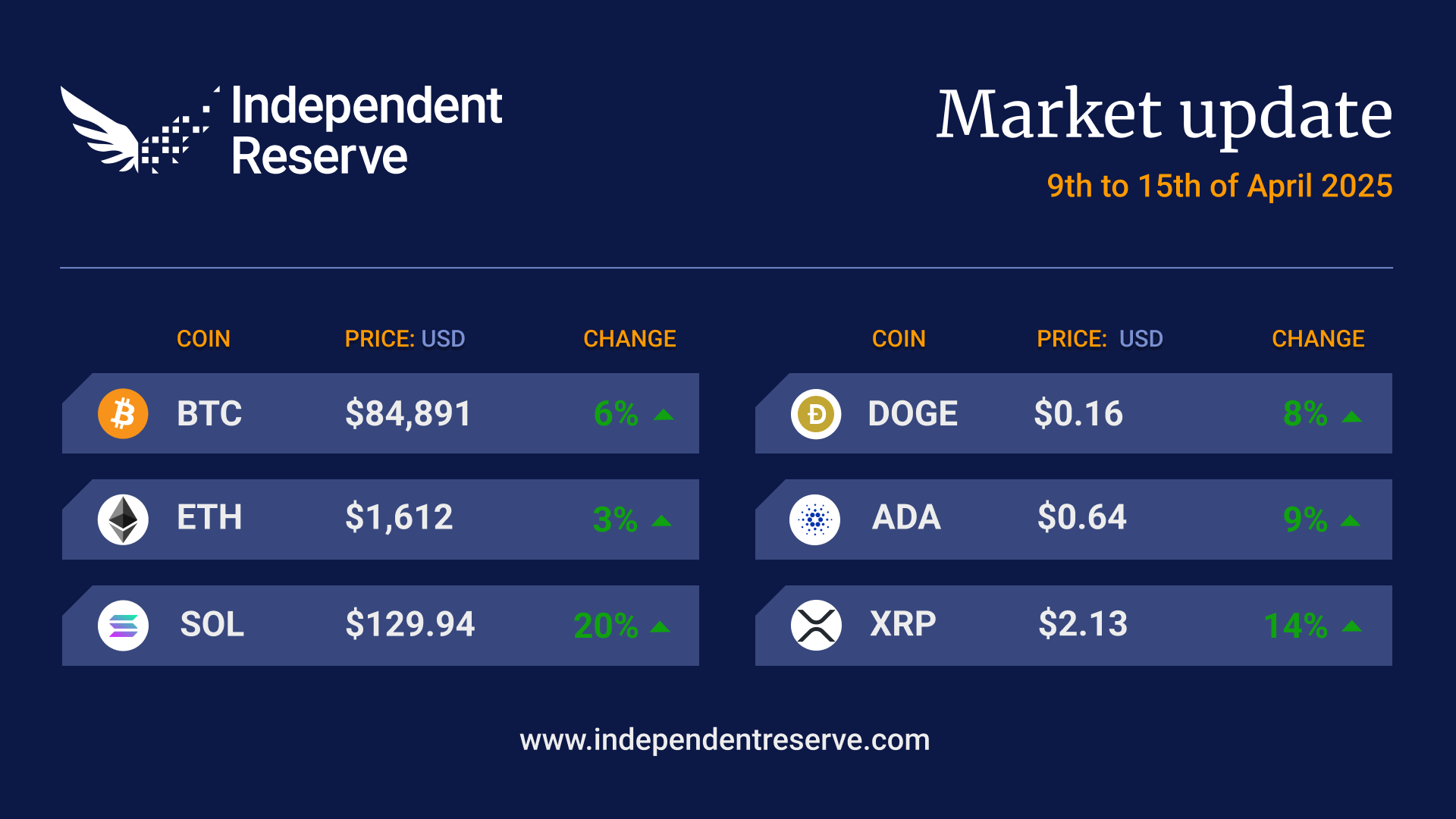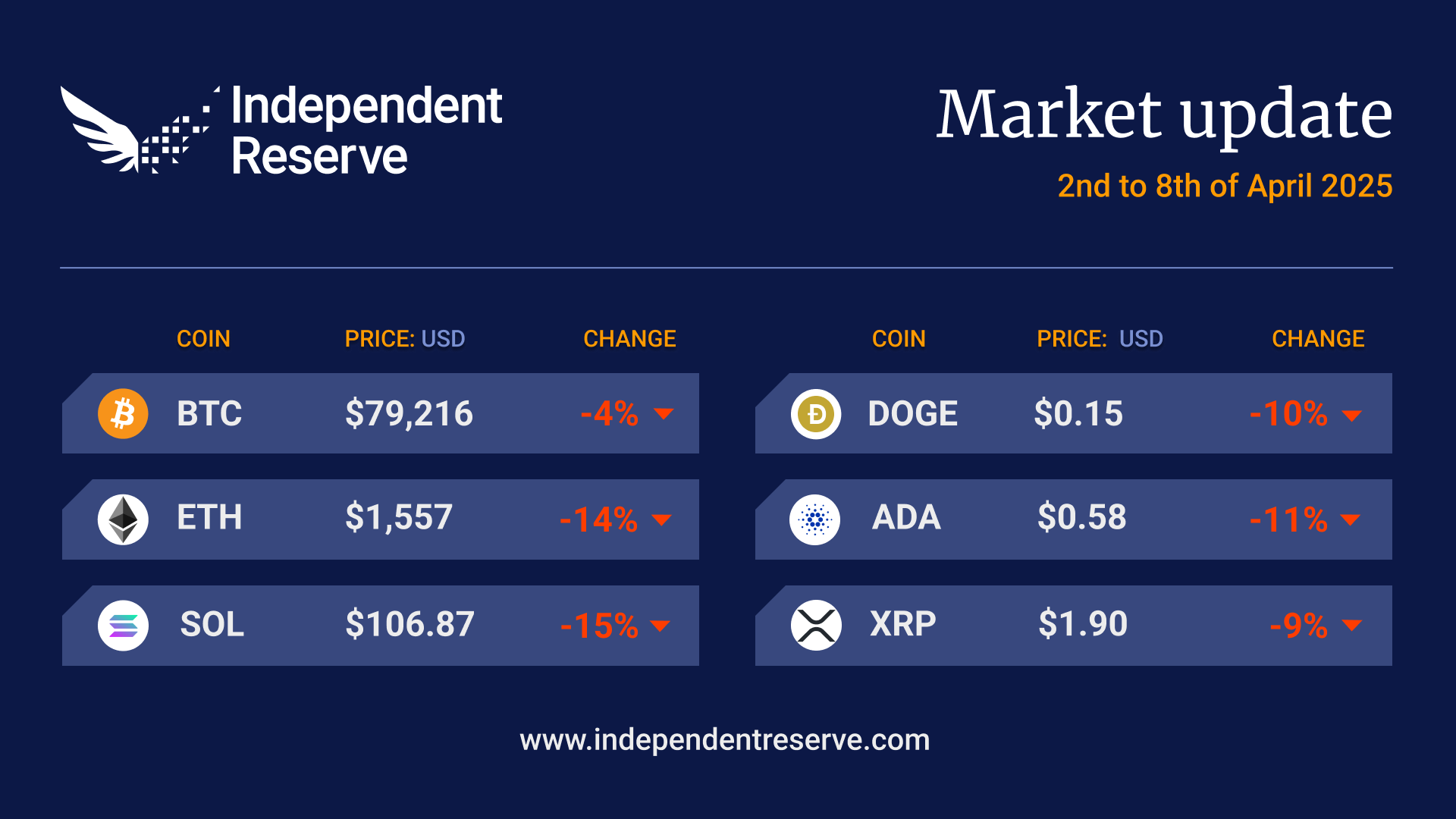In Markets
Bitcoin’s pullback this week led Pantera to speculate the US election was another “Buy the rumour, sell the news” event while CoinShares wrote the “post-U.S. election honeymoon is over.” However, the overall crypto market cap is up almost $1 trillion since Trump’s election, even as the S&P 500 dropped back to its November 5 level. The big news this week was the release of the US Federal Reserve’s December minutes showing it would likely pause interest rate cuts over concerns about sticky inflation (with new inflation figures coming out mid-week). Markets were pricing in three cuts, but now it’s just one. Strong jobs data raised further inflationary concerns, and news broke about the US Government getting the green light to sell 69K Bitcoin. Bitcoin finishes the week down 7% to trade around A$152,617 (US$94,559). Ethereum lost 14% to trade around A$5,063 (US$3,136), XRP gained 5% as JPMorgan projected up to $8B inflows into a potential ETF, Solana lost 15%, while Dogecoin (-13%), Cardano (-12%) and Shiba Inu (-15%) were also down. January dumps in post-halving years are nothing new, and Bitcoin went on massive bull runs after dumping in January 2017 and January 2021. The Crypto Fear and Greed Index is at 61, or Greed.
Independent Reserve has also listed two new tokens, RENDER and WIF, which are now available for trading.

From the IR OTC Desk
Market sentiment and price movement:
Market sentiment was negative throughout the week as the US$100,000 level for BTC/USD failed to hold. The markets started off heavily when the U.S. Department of Justice was cleared to sell US$6.5 billion worth of Bitcoin seized from the Silk Road. The bearishness accelerated after the FOMC minutes were released last week. In these minutes, the Committee expressed concerns about inflation and the impact of President-elect Trump’s policies, indicating an overall hawkish tilt for 2025. BTC/USD dropped from US$102,225 to lows of US$89,184 on Independent Reserve before recovering to trade around US$95,000.
Liquidations and market volatility:
Liquidations were rampant amid high volatility. Over the last 24 hours, for example, a total of US$767 million worth of positions were liquidated, according to data from Coinglass, with US$212 million in shorts and US$555 million in longs liquidated. Interestingly, Ethereum saw a greater number of positions liquidated due to the magnitude of the price drop. Across the board, altcoins experienced sharp declines as TOTAL3 (an altcoin index tracking the market cap of coins other than BTC and ETH) fell from US$1.05 trillion at the start of the week to lows of US$905 billion overnight. Correspondingly, Bitcoin dominance increased from 57% to 58.5% over the week.
OTC desk activity:
On the OTC desk, there was an increase in flows to kick-start 2025 as USDT regained parity. Overall, the desk observed more sell flows than buy flows for the week, with AUD being an attractive pair to convert to as AUD/USD dipped to lows of 0.6132.
Key economic calendar events:
Here are the key economic calendar events for the coming week (all times in AEDT):
- Thursday, January 16, 12:30 a.m.: U.S. Core Inflation Rate YoY, Consensus 3.3%
- Thursday, January 16, 11:30 a.m.: Australian Unemployment Rate, Consensus 4%
- Friday, January 17, 1.00 p.m.: Chinese GDP Growth Rate YoY, Consensus 5%
For any further information, please feel free to reach out.
In Headlines
Trump to issue executive orders on day one
The Washington Post reports that Donald Trump is expected to issue executive orders pertaining to crypto straight after his January 20 inauguration. The orders “may address issues including de-banking and the repeal of a controversial crypto accounting policy requiring banks holding digital assets to count them as liabilities on the bank’s own balance sheet,” the paper reports. The Australian meanwhile reports that Bitcoin could hit A$402,000 (US$250K) this year due to the Trump administration’s favourable crypto policies.
Tether moves to El Salvador
Tether is relocating from the British Virgin Islands to El Salvador after acquiring a digital asset service provider license, citing the country’s support for Bitcoin. Tether Chief Executive Officer Paolo Ardoino said the move was a “natural progression” for the company and would allow it to focus more on emerging markets. Last year, Tether’s profit was equivalent to almost one-third of El Salvador’s entire GDP.
SEC overreach slammed by yet another court
The US Court of Appeals for the Third Circuit slammed the SEC for its approach to crypto while granting Coinbase a partial victory against the regulator. A panel of judges criticised the SEC for failing to adequately justify its denial of Coinbase’s application for rulemaking for crypto assets, deeming its reasoning “arbitrary and capricious.” “The SEC repeatedly sues crypto companies for not complying with the law, yet it will not tell them how to comply,” the ruling states. “Existing rules do not fit blockchain technology, but the SEC refuses to recognise this.” The judges ordered the SEC to come up with a detailed explanation of its reasoning for denying Coinbase’s rulemaking petition.
Green light to sell 69K Bitcoin
The US District Court for the Northern District of California has given the green light to the US government to liquidate 69,370 of seized Silk Road Bitcoin. The ruling denying a bid to block the sale was actually made on December 30 but only came to prominence last week. This doesn’t mean the government will sell the Bitcoin by January 20 to thwart Trump’s Bitcoin stockpile proposal, however. Asset Reality’s Aidan Larkin said there is a strict process to go through, including a civil forfeiture application hearing. “They will get their green light and then it will fall into the normal Marshals process and public domain,” he said. From there, we’ll eventually see Coinbase move the Bitcoin on-chain before it’s sold off.
New Treasury Secretary owns Bitcoin
Scott Bessent, the hedge fund founder who Donald Trump picked for Treasury Secretary, has assets and investments worth US$700 million (A$1.13B) according to the New York Times, including US$500,000 (A$810K) worth of BlackRock’s iShares Bitcoin ETF. However, he’ll be selling that off after he’s confirmed to avoid a conflict of interest. Senator Elizabeth Warren just wrote a letter to him asking for answers about what strong anti-crypto measures he’ll take.
More last-minute crypto rules
The US Consumer Financial Protection Bureau has pitched new regulations that impact stablecoin issuers and wallet providers by setting up a framework to apply the Electronic Fund Transfer Act to them. This would require consumer disclosures, protections against unauthorised transactions and the ability to cancel improper transfers, all of which can be tricky in crypto. CFPB Director Rohit Chopra is reportedly unlikely to step down as SEC boss Gary Gensler did, so the regulations (now open for public comment) could be finalised and implemented. However, Trump has the power to fire Chopra, or Congress could overturn the rules.
Traders sad, long-term investors bullish
Wave Digital’s David Siemer says trader confidence has been shaken by Bitcoin’s current volatility – but that long-term investors are more bullish than ever. “In 14 years of owning bitcoin, I’ve never seen a dichotomy like this,” Siemer told CoinDesk. “The traders are all worried and nervous and hedged, fully neutral or worse. And the long-term people are all super bullish.” Simer expects we may see US$200K (A$324K) this year as some countries establish a Bitcoin reserve even if the US doesn’t. “More is going to happen in the next six months than most people realise,” he said. Real Vision CEO Raoul Pal meanwhile thinks that not only are we still in the “banana zone”, but we’re headed for a “banana singularity… when everything goes up.”
Bits and pieces
Singapore has banned the crypto prediction platform Polymarket. A survey of 430 financial advisors by Bitwise Asset Management found the number of advisors allocating clients to crypto had doubled from 11% in 2023 to 22% last year. More than half (56%) said they were more likely to invest in crypto due to Trump winning the presidency. The spot Bitcoin ETFs turned one year old this week, generating $660 billion (A$1.07T) in trading volume since launch. North Dakota and New Hampshire have both made moves towards establishing a Bitcoin reserve, joining Ohio, Texas and Pennsylvania.
Until next week, happy trading!


